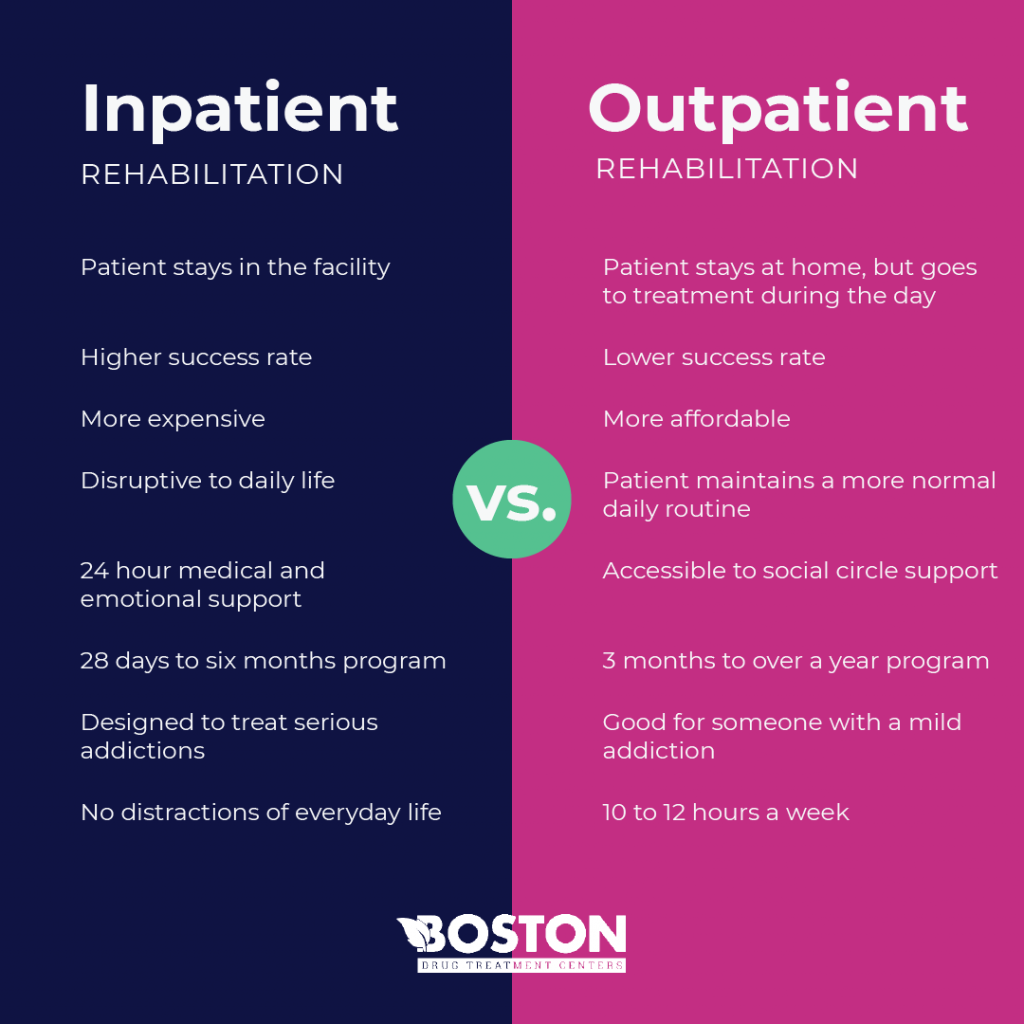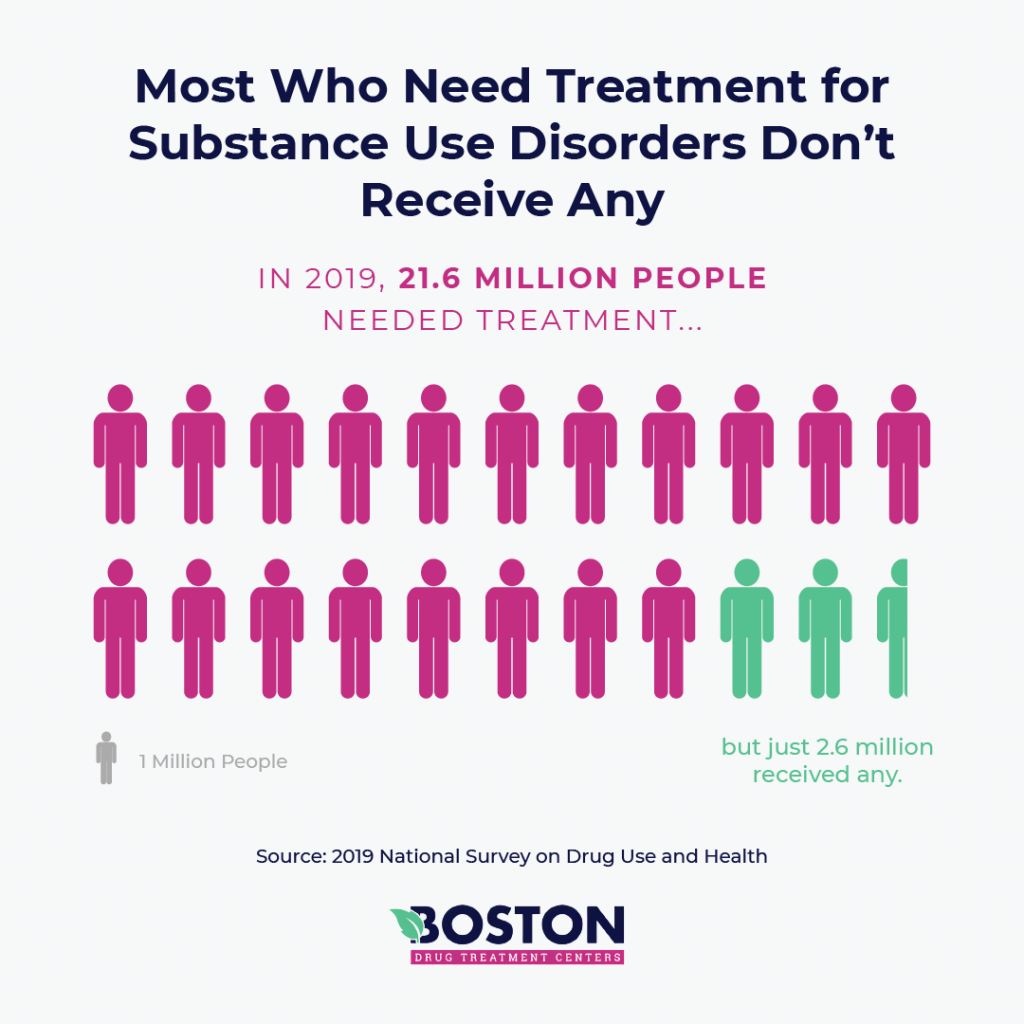
Does Insurance Cover Rehab in Massachusetts?
October 27, 2021
What is Biofeedback Therapy?
October 28, 2021If you or a loved one struggles with a drug or alcohol addiction, a rehab facility can provide professional treatment and a supportive environment.
This guide will help you understand if inpatient or outpatient rehab is better for you.
Choosing the right rehab are the first steps towards recovery. While one is not better than the other, choosing an inpatient or outpatient treatment plan to suit your needs will help ensure long-term recovery.

Inpatient Addiction Treatment
When you go through inpatient treatment, you live at the drug rehab facility for 24-hour medical and emotional support. This treatment is especially helpful for those with a severe substance use disorder, a home environment unsuitable for appropriate treatment, or if you or a loved one is struggling with mental health. Living at a professional rehab facility provides you with intensive care to ensure structured support is always available.
24-hour inpatient rehab facilities focus help patients through medically assisted detox and then combat withdrawal symptoms. Much of the assistance comes from guidance about living a healthy lifestyle after treatment ends. Typically, inpatient treatment programs can span anywhere from a few weeks to several months depending on your needs.3
Advantages of Inpatient Rehab
- Safe, Regulated Environment – While participating in an inpatient rehab program, you get the peace of mind knowing you or your loved one is fully protected and in a safe, controlled environment. Living at a treatment center may provide a more stable atmosphere, encouraging a successful recovery.
- Medically Assisted Detox – The process of detoxification can be daunting without professional medical assistance. During inpatient treatment, you or your loved one may benefit from medically administered detoxification, mitigating dangers associated with withdrawal symptoms from substance use disorders.
- Elimination of External Stressors – By recovering in a regulated environment, you or your loved one does not have to worry about external stressors, temptations, or triggers that could make recovery more difficult.
- 24-Hour Care – During inpatient treatment, you or your loved one will receive around-the-clock care for both physical and emotional recovery. This is especially important during the detoxification phase, as withdrawal is often associated with side effects that medical professionals can best treat.
Disadvantages of Inpatient Rehab
- Cost – The associated costs of an inpatient treatment program can be high for some families. Paying for housing, meal, and extended stay requirements is not feasible for some patients.
- Disruption of Life Responsibilities – During inpatient treatment, you or your loved one will spend extended time away from critical life responsibilities such as work, school, taking care of family, and so on.
- Separation from Loved Ones – While obtaining treatment in an inpatient facility, you or your loved one will be away from typical friends, family, and supporters who would otherwise be available.
Who Should Consider Inpatient Rehab?
While inpatient treatment may be beneficial to many who struggle with substance use, certain parameters make it more helpful to certain people.
You should consider inpatient treatment if you answer yes to any of the following:
- Suffering from a severe substance use disorder
- Using multiple substances at once
- Has a co-occurring medical condition
- Has a co-occurring mental health condition
- Has had trouble with withdrawal in the past
- Lacks an adequate home environment for recovery
Withdrawal from certain substances, like alcohol and benzodiazepines, can come with serious and dangerous side effects. If you answered yes to one or more of the above points, it is highly recommended that you seek inpatient treatment for the safest recovery possible.
Outpatient Rehab
Outpatient rehab allows you to live at home while still receiving treatments at a professional rehab facility. This makes outpatient rehab far less intensive than inpatient programs. Typically, outpatient recovery programs require you to spend around 12 hours per week at the treatment facility and can last anywhere from 3 to 12 months.3
If you or a loved one is dealing with a moderate substance use disorder, or you are unable to commit to inpatient rehab but would still like to seek treatment, outpatient rehab is a great choice.
Outpatient treatment is particularly helpful if you or a loved one cannot take extended time away from everyday responsibilities like work or school. Like inpatient programs, outpatient recovery programs start with detoxification, if necessary.
Pros of Outpatient Rehab
- Cost – Outpatient programs have a lower cost because there are no room or board fees associated with them. This makes it more manageable for some families.
- Less Disruption of Everyday Life – Outpatient rehab allows you or your loved one to receive treatment while still participating in and managing everyday life. You receive professional help without taking time away from responsibilities like school or work.
- Duration of Treatment – With lower upfront costs and fewer restrictions, the length of treatment can be much longer than inpatient. This means you or your loved one will retain access to professional physical and emotional support over longer durations of time. This can prove beneficial for ensuring long-term sobriety.
- Keep Support Group – Moving between the treatment facility and home means access to you or your loved one’s normal support systems, like friends and family. Having the support of loved ones can greatly lower the pressure or anxiety of undertaking a rehab program.
- Recovery at Home – Outpatient treatment allows you or your loved one to receive professional help to recover from addiction while staying in the comfort of your familiar home. This can lower the stress and anxiety of a rehab program and provide peace of mind through the recovery process.
Cons of Outpatient Rehab
- No 24-Hour Care – While staying outside of the treatment facility, you or your loved one will not have access to 24-hour physical and emotional care. Having this 24-hour can provide peace of mind during recovery and may be beneficial when coping with symptoms of withdrawal.
- Possible Exposure to Stressors – Being outside of the treatment facility, you or your loved one will have more exposure to typical stressors, temptations, or triggers that may make the recovery process more difficult.
Who Should Consider Outpatient Rehab?
While outpatient treatment may benefit many who struggle with substance use, the below parameters make it more helpful to some.
You should consider outpatient treatment if you answer yes to any of the following:
- Struggling with mild to moderate substance use
- Has a strong support system in place
- Has a safe home environment to recover in
- Cannot take time away from responsibilities such as school, work, etc.
- Has reliable transportation to treatment sessions
Whatever You Choose, Recovery is Possible

As of 2019, nearly 1 in 10 people who need treatment do not receive any. No matter which recovery option you choose, you or your loved one start towards lifelong recovery. Both inpatient and outpatient options provide the professional treatment needed to move away from substance use and live a more fulfilling life.
No matter which option you choose, treatment can provide physical and emotional support to aid in recovery and give you the proper tools to ensure recovery does not stop after rehab.
Call our free, 24/7 private helpline today to talk to a treatment support specialist to find a rehab program that is right for you at 857-577-8193.
Resources
- 2019 National Survey of Drug Use and Health (NSDUH) releases. SAMHSA.gov. (2019).
- Hostetter, M., & Klein, S. (2017). In focus: Expanding access to addiction treatment through Primary Care. Commonwealth Fund.
- National Institute on Drug Abuse. (2020, June 3). Types of treatment programs. National Institute on Drug Abuse.

